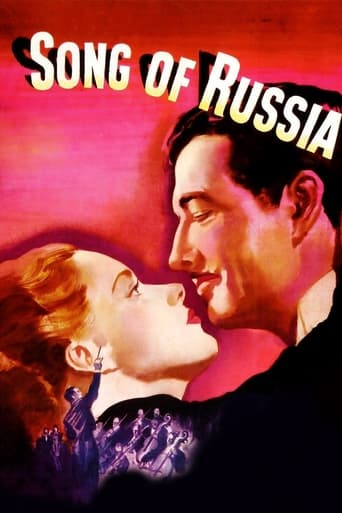Rodion Telyatnik
The song of Russia isn't the face of Russia. The essence of a song (for any creature) is a call for unattainable beauty, isn't it? Does this film call to arms (to be war propaganda like German colored film "Kolberg" or Japan anime "Momotaro: Umi no Shinpei")? Only in the sense of defending the beauty in our hearts (love, devotion, patriotism). No one mention about communism and its spreading, only the call by means of music for help during wartime regardless social and cultural differences, this is a noble step from Americans and why they have been feeling ashamed after that (like enamored and betrayed)? The live action seems to be a beautiful art, not an ugly artificiality, maybe pompous as usual background for love or heroic story wherever it happens, so it can't be regarded like awful propaganda as hurt Ayn Rand said in her HUAC negative testimony about the film. Her words "They (russians) try to live a human life, but you understand it is totally inhuman" are totally reductionism. What about American view of Soviet Russia, I've never found it adequate (in contrary to the style of socialistic realism in soviet films), and American stamps in Russian context always looks funny for me, but the humanistic kindness and classical music in the film erases ambiguity and national differences. No wonder I'm pleased with the film =)
gvfj
I own this film on DVD, having bought it from a private collector a while back. I like it, not for its plot, musical score or cinematography, but for the simple reason that it was a brash attempt by the government of the day to encourage Americans to sacrifice themselves to save a regime that represented the secret wishes of an elite circle of Washington insiders. I was stimulated to search for a copy after reading Ayn Rand's 1947 testimony before the HUAC committee on-line. Long interested in this pivotal period of world history, I had previously acquired the German newsreels for the latter part of 1941 (i.e. Operation Barbarossa). German army cameramen had recorded a great deal of the conditions in the cities such as Kiev, Minsk, Smolensk, Nikolayev, and dozens of rural villages in the Ukraine, Belarus and Russia. Their impossible-to-stage pictures showed first-world, European people, in the middle of the twentieth century, living in a degree of abject poverty, squalor, and despair which Americans would not believe without seeing. It rivaled the worst of the third world. Humans intentionally treated as expendable beasts of burden by their Bolshevik oppressors.So for Hollywood to produce such a glaring lie (not to mention distortion of the chronology of events) as "Song of Russia" in order to persuade people to support, or even risk life to participate in, a war to save such a regime is practically an act of enmity against its own people, in my opinion. It's easy to see why the Hollywood crowd is trying to make this movie disappear down an Orwellian memory hole. Highly recommended for anyone who doubts that Hollywood is anti-American.
Charles Reichenthal
Revisionist history can prove unfortunate. There is very little that moves along with apparent 'truth' in this film, BUT it was made at a critical time in our history -- a time when it was necessary to create unity between those fighting the horrors of Nazism. No, the film is not a very good one, but it is a formidable piece of history and should be watched with the adult comprehension of the time. And there is absolutely NO EXCUSE for the wreckage wrought by McCarthy-Cohn and their henchpeople during the Red Scare era that destroyed lives!! No excuse at all. As for SONG OF RUSSIA, it should also survive as a reminder of the screen aura of Susan Peters. (As for her true abilities, watch this one and then SIGN OF THE RAM!!) Along with the obvious propoganda about the 'perfect' society of the USSR, the worst part of this film, of course, is the usually awful performance of Robert Taylor, whose post-War attitudes were those of a true coward, as well as a lousy actor.
Piper12
Who knew that life under a brutal totalitarian regime could be so carefree? Even though the film was made for World War II propaganda purposes, the inanities that litter this film have to be seen to be believed. (That would be difficult, I know, since it is not available on videotape. or DVD.)Among the aspects of Russian life, circa 1941, to which this film introduces us are: town meeting democracy, freedom of religion, rural peasants who eat hearty meals at tables set with china, crystal and silver, and on and on. Soviet barbarities are played down or, more usually, ignored altogether. I saw this film in Washington around 1983 as part of a twin bill with the other infamous WWII paeon to Stalin's Russia, "Mission to Moscow." I think the latter was, in places, at least a bit more honest than this rose-colored clunker. If ever you wondered why Congress went hunting for Communists in Hollywood, check out these two films.



